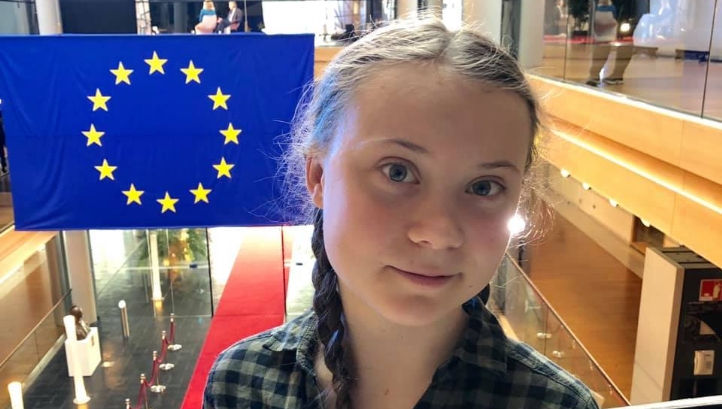The teenage climate activist Greta Thunberg has chided EU leaders for holding three emergency summits on Brexit and none on the threat posed by climate change.

Thunberg urged MEPs to “wake up and take action”. Image: Greta Thunberg
In a clarion call to Europe’s political leaders ahead of European parliament elections in May, the founder of the school strike movement said if politicians were serious about tackling climate change they would not spend all their time “talking about taxes or Brexit”.
In a typically blunt speech, she said politicians were failing to take enough action on climate change and the threats to the natural world.
“Our house is falling apart and our leaders need to start acting accordingly because at the moment they are not,” the 16-year old schoolgirl from Sweden told a standing room-only meeting of MEPs and EU officials in Strasbourg.
“If our house was falling apart our leaders wouldn’t go on like we do today,” she said. “If our house was falling apart, you wouldn’t hold three emergency Brexit summits and no emergency summit regarding the breakdown of the climate and the environment.”
While climate change is sometimes discussed at the EU’s regular summits, the issue has never dominated because Brexit, migration or the eurozone crisis have monopolised the attention of Europe’s top leaders.
Greta’s 10-minute speech was interrupted by frequent applause and ended with a 30-second standing ovation.
Before she began speaking, many in the room rose to their feet to applaud and take photos of her as she sat on the podium surrounded by cameras.
As the young climate activist spoke of a “sixth mass extinction”, her voice faltered. “The extinction rate is up to 10,000 times faster than what is considered normal, with up to 200 species becoming extinct every single day,” she said. “Erosion of fertile topsoil, deforestation of the rainforest, toxic air pollution, loss of insects and wildlife, acidification of our oceans – these are all disastrous trends.”
She was applauded after getting to the end of the passage and continued the speech without faltering again.
Greta had previously addressed the UN climate change summit in Poland and the World Economic Forum in Davos since her lone protest outside the Swedish parliament last August triggered a worldwide school strike movement to raise the alarm about climate change.
Neither was it the first time Greta had taken her uncompromising message to the EU institutions. In February, she told an audience including the European commission president, Jean-Claude Juncker, the EU needed to double the ambition of its climate targets.
At that time, the parliament’s senior leaders, led by the European parliament president, Antonio Tajani, decided against inviting Greta to address MEPs in the parliament’s debating chamber. Centre-right and liberal groups argued against the invitation, which had been proposed by the Greens. Objections ranged from the potential vulnerability of a child exposed to the chamber to a desire to reserve the plenary address for politicians or senior officials.
The meeting took place in the more low-key setting of a special meeting of the European parliament’s environment committee.
Noting the imminent European elections and the fact that her generation could not vote, Greta urged MEPs to listen to scientists and millions of children who had taken part in school strikes. “In this election, you vote for the future living conditions of humankind,” she said.
Referring to Monday’s fire at Notre Dame in Paris in her speech, Greta called for “cathedral thinking” to tackle climate change.
“It is still not too late to act. It will take a far-reaching vision, it will take courage, it will take fierce, fierce determination to act now, to lay the foundations where we may not know all the details about how to shape the ceiling,” she said. “In other words it will take cathedral thinking. I ask you to please wake up and make changes required possible.”
Jennifer Rankin
This article first appeared on the Guardian
edie is part of the Guardian Environment Network
